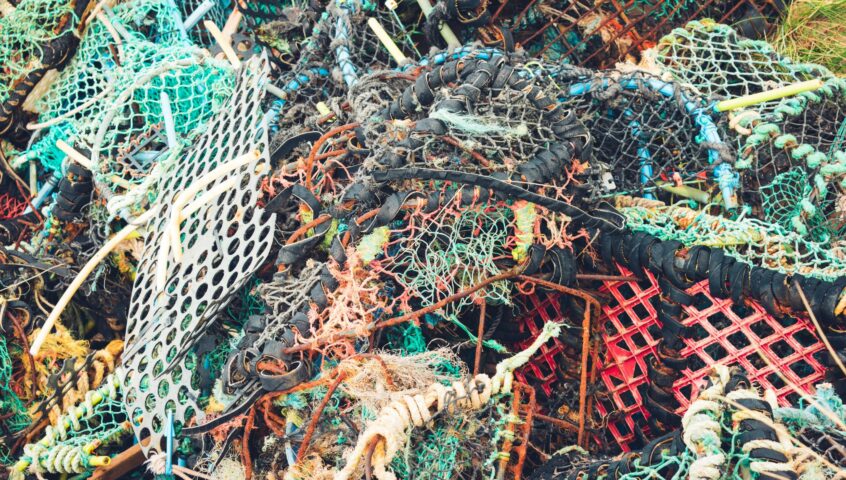When the dangerous spectre of lost fishing gear haunts the New Brunswick oceans, ghost-gear busters in the outer Bay of Fundy take action.
The Bay of Fundy’s shorelines and waters get littered with various types of debris, including lost fishing gear and nets from aquaculture and other industries. This ghost gear poses a significant threat to marine species and human activities.
But over the past several years, groups in the outer Bay of Fundy have become leaders in tackling this issue. The Conservation Council of New Brunswick has pushed industry and worked with various local organizations to make a significant difference in protecting our oceans from marine debris.
The nature of marine debris
Marine debris in the outer Bay of Fundy includes large and submerged items like fishing gear or salmon aquaculture cage components and nets, distinct from the more visible plastic bottles and floating trash.
This gear can become lost in many ways, including getting caught on the seabed, being disturbed by boats and getting entangled in other debris on the sea bottom.
Some of this lost gear, especially rope, can even float up into the water column. Over time, marine plants can grow on this lost gear, causing it to sink. But as the plants decay, the gear resurfaces, making detection and removal challenging.
This ghost gear, often made from plastic materials, breaks down into smaller pieces over time. Unlike older materials like hemp ropes and wooden traps, modern fishing gear made of steel and plastic persists indefinitely, posing long-term environmental risks.
Enduring impact
Ghost gear also continues to fish even after being lost.
In the Bay of Fundy, lost lobster traps remain baited, trapping lobsters and other animals indefinitely. These creatures become bait for others once they die, creating a continuous, deadly cycle. While some improvements, like escape hatches on lobster traps, can help, this lost gear remains a threat until removed. Nets and ropes can also entangle larger marine animals.
While essential for harvesting, fishing gear can cause severe unintended harm to marine life and habitats.
Tackling the problem
However, efforts have been underway for decades to address this issue in New Brunswick.
The Fundy North Fishermen’s Association developed, and continues, a sophisticated program to find and remove ghost gear using fishers’ knowledge of the region. The Conservation Council of New Brunswick worked with Fundy North to map debris from other industries, especially salmon aquaculture and set up a roundtable process to hold those responsible for the debris accountable, pressuring them to remove the debris.
Growing concern about the marine impacts of plastics has led to greater collaboration in southwestern New Brunswick to address the problem. Two other initiatives worth checking out are the Great Fundy Coastal Cleanup led by the Nature Trust of New Brunswick and the Huntsman Marine Science Centre’s #DebrisFreeFundy program.
Systemic change
Despite growing awareness and efforts, systemic changes are necessary for widespread impact against ocean debris.
The value of locally owned and operated fishing is significant for Atlantic Canada’s communities.
Ghost gear and marine debris affect marine ecosystems and the species we consume and endanger fishers who work in hazardous conditions. Ensuring our oceans are free from large debris and ghost gear is vital for safer, more sustainable fishing operations.
Responsibility often falls on individuals, but changes in supply chains and legislation are crucial. The prevalence of plastic packaging and inadequate recycling options exacerbate the problem of smaller debris.
The oceans are crucial, serving as the lungs of our planet and vital for oxygen production and climate regulation. The biodiversity within them is essential for our survival, making the impact of marine debris a global concern.
Ghost gear and marine plastics are global issues without a one-size-fits-all solution. The path forward begins in our local communities. By working together, sharing knowledge and advocating for systemic changes, as we have seen in southwestern New Brunswick, we can tackle the marine debris problem, ensuring healthier oceans for future generations.
Written with help from Kyle Reid

